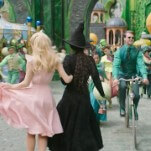Serenity

Usually, critics are allotted one rating per movie. Most of the time this works out, since most films, mess or masterpiece, clearly achieve, partially achieve or fall short of a particular tone and aesthetic. What’s promised in the first ten minutes usually comes to pass or fails to appear by the final ten. If there’s a revelation or a set piece that dazzles or disappoints, drastically changing what we thought we’d get out of the flick, it’s usually connected to the steady course charted by cast and crew. Even subversive, genre-bending material can be somewhat categorized and understood in a way that summarizes what kind of an audience might hate it or love it. But every so often, the regular critical approach falls short. Every so often, along comes something like Serenity, a hypnotically bizarre, bug-eyed nuts, deliciously stupid, endlessly entertaining cluster of a schlockfest that you might just hate. Or love. Or simply be confused by.
Yet, as much as I was captivated by it, I can’t quite declare Serenity a “good” movie viewers should flock to the theaters to see. (I can say, “Beware the blatantly wrong-headed marketing campaign.”) So, for this film, let’s break it into three separate grades. (The reader can decide which grades matter the most.)
Serenity was written and is directed by Steven Knight, who previously penned a bunch of terrific dark and moody thrillers like Dirty Pretty Things and Eastern Promises, and wrote and directed the single-location Tom Hardy powerhouse Locke. The film stars Matthew McConaughey and Anne Hathaway—prestige talent for what the marketing so desperately wants to sell as a prestige thriller—and the plot seems ripped straight from one of those mid-budget pieces of self-consciously serious but semi-pulpy adult-oriented genre fare that Hollywood mostly left behind after the ’90s.
McConaughey is a loner fisherman named Baker, who escaped to a remote island and changed his name years ago in order to get away from his troubled past. As it does to all noir protagonists, that past catches up with Baker, here in the form of his estranged ex-wife, Karen (Hathaway), who has tracked him down for a single purpose: She wants Baker to kill her abusive mob boss husband, Frank (Jason Clarke). Will Baker go down this sinful path, also saving his son (Rafael Sayegh) from Frank’s wrath, or will he listen to his better angels and avoid dooming his soul? It sounds like a pretty clear-cut premise we can expect from a movie of this caliber. Yet Knight makes some bafflingly pedestrian choices, up to a point where his work evokes the blatant melodrama of a Lifetime Channel domestic thriller rather than a major Hollywood release.
-

-

-

-

-

-

-

-

-

-

-

-

-

-

-

-

-

-

-

-

-

-

-

-

-

-

-

-

-

-

-

-

-

-

-

-

-

-

-

-








































